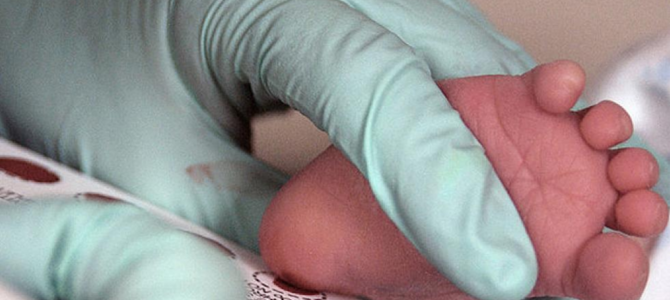
The coronavirus pandemic has intensified the discussion about the right to biological privacy. Dr. Anthony Fauci at White House press conferences muses about “certificates of immunity” to be carried by Americans who have antibodies to the virus. Bill Gates advocates a national tracking system so the government can see where the virus is. Whether his envisioned system involves microchipping the population is the subject of some debate.
Privacy advocates warn about allowing the government to cite “public health” as an excuse to collect and track sensitive biological data. But many Americans don’t realize the federal and state governments are already using deeply sensitive genetic data, without consent, for both research and profit.
The best example is the storage and exploitation of individual DNA taken pursuant to the newborn genetic screening test. In almost every state, blood spots from each newborn are sent to the state public-health laboratory to be tested for certain genetic conditions. Too often, however, the blood samples aren’t destroyed after they’ve served the purpose for which the parents consented. Instead, according to the Citizens’ Council for Health Freedom (CCHF), the DNA samples are frequently tucked away for future use unrelated to the purposes of the screening.
Newborn DNA Is Being Used Without Parental Consent
Investigations have found that in California, “[b]lood spots are given [sold] to outside researchers for $20 to $40 per spot.” Indiana has given researchers access to 666 banker boxes full of 23 years’ worth of newborn DNA. Texas has been a battleground between the state Department of Public Health and parents who filed a lawsuit after discovering the department’s sale and distribution of their babies’ DNA without their consent. Similar lawsuits have been filed in Michigan and Minnesota.
CCHF monitors these state developments and is focused particularly on federal activity. In 2013, the federal government funded a five-year project to explore sequencing the genome of every child at birth. National Institutes of Health Director Dr. Francis Collins declared, “Whether you like it or not, a complete sequencing of newborns is not far away.”
Congress acted in 2014 to protect infants’ privacy by including a parental-consent requirement in the Newborn Screening Saves Lives Reauthorization Act. That meant any federally funded researchers would have to obtain parental consent before using an infant’s DNA. According to CCHF, the understanding was that parental-consent protections would be incorporated into what’s called the Common Rule, which governs federally funded research on human subjects.
It didn’t happen that way. On the last day of the Obama administration, the Department of Health and Human Services issued the final version of the Common Rule, specifically eliminating the parental-consent requirement. So as it stands now, babies’ DNA may be used in federally funded research without parents’ consent or even notification.
Sen. Lamar Alexander, R-Tenn., chairman of the powerful Health, Education, Labor, and Pensions Committee, is trying to remedy this problem. He is expected to add language to the Newborn Screening Saves Lives Reauthorization Act of 2019, which may come up for a vote shortly after Congress resumes, that will restore the parental-consent requirement in federally funded research. CCHF and multiple other organizations concerned about citizen privacy are working to persuade other senators to support Alexander’s effort.
If asked by researchers to use a child’s DNA for a specific study, with stringent privacy protections, most civic-minded parents would probably be happy to help advance medical knowledge. Indeed, the National Human Genome Research Institute has observed, “[W]hen given control over when and with whom their research data is shared, most individuals are eager to participate in research studies, fueling scientific discovery and medical progress.” But a 2009 study found only 28.2 percent of parents were willing to have their newborn’s blood spots used for research if permission was not obtained.
Obtaining consent, however, requires time, effort, and expense, and universities and corporations that benefit from keeping parents in the dark are pressing to keep it in place. So Alexander’s protective language is by no means a slam dunk.
Bio Data Access Gives Government Unfettered Control
The Wuhan virus crisis illustrates another facet of the campaign to broaden access to Americans’ DNA and other biological data. It’s not just about money; it’s about control. If the government has access to DNA and other health markers, it can more easily direct people along government-approved paths.
Do you want to attend concerts, football games — or church? Sorry, your blood tests show you don’t have antibodies. Do you want to get on an airplane? Roll up your sleeve for the vaccination. We can’t risk another pandemic.
As for genetic information, National Human Genome Research Institute ethicists point out another danger of nonconsensual testing and exploitation: “These [DNA] tests can reveal sensitive or embarrassing personal information, which could be of significant concern for individuals in the public spotlight.” When all babies’ DNA is stored forever and accessible to whoever has the most money or political clout, no one’s most fundamental privacy is secure.
DNA data could also be highly valuable in determining access to medical care. Federal law currently prohibits use of genetic information in employment or health insurance-coverage decisions. But if “Medicare for All” becomes reality, there will be enormous pressure to ration care to contain the inevitable runaway costs.
An easily accessible bank of all Americans’ DNA would be a treasure trove for health bureaucrats tasked with cutting costs. A baby born today might find in 50 years that he’s not eligible for a certain treatment because of what the government discovered by dissecting his DNA without consent.
Privacy is fundamental to American liberty. You can’t have freedom without it. The Fourth Amendment to the Constitution protects “the right of the people to be secure in their persons, houses, papers, and effects, against unreasonable searches and seizures.” In obedience to this principle, all states allow the taking of an adult’s DNA sample only if the person is convicted of, or in some cases arrested for, a crime.
Infants don’t commit crimes. Especially when the stakes are so high, there is no reason to give them less protection than adults. Congress should ensure privacy rights are protected for all Americans, starting at birth.









